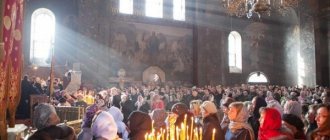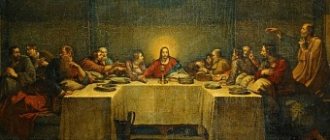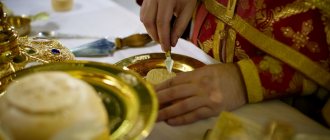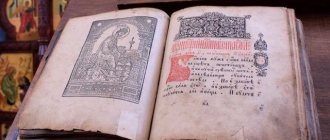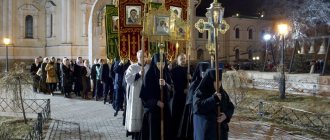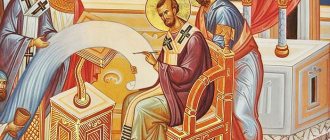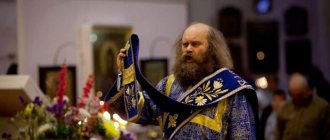Website of the Gorlovka and Slavic diocese
What does the Church pray for in the words of the psalms of the third and sixth hours?
The first Christians observed the custom of offering prayer every three hours. Over time, a watch service was formed. At nine in the morning, in accordance with our time, the third hour was read (the first hour was considered the time of sunrise - approximately seven o'clock in the morning). At noon, Christians read the sixth hour prayers. Today, the morning service in the Orthodox Church begins with the reading of the third and sixth hours. Immediately after the hours, the Divine Liturgy is celebrated. Therefore, the third hour begins with the priestly exclamation “Blessed is our God” and the initial prayers - “To the Heavenly King”, “Trisagion”, “Our Father” and others.
Third hour
Heavenly King, Comforter, Soul of truth, Who is everywhere and fulfills everything, Treasure of good things and Giver of life, come and dwell in us, and cleanse us from all filth, and save, O Good One, souls ours.
Sy - “existing”.
Blagikh - “good”.
Then, after the prayer “Come, let us worship,” psalms are heard.
Psalm 16
This is a prayer for intercession and help in the fight against spiritual enemies - demons.
Hear, O Lord, my righteousness, listen to my prayer, bring my prayer not into flattering lips.
Truth is a “fair request.”
Inspire - “hear.”
From Your presence my destiny will come, let my eyes see righteousness.
Fate - “court, sentence.”
Vidita - “they will see.”
For the words of Your walls I have kept the cruel ways.
For words - “for the sake of words.”
Cruel - “heavy, difficult.”
Complete my steps in Your paths.
Complete - “confirm.”
Surprise Your mercies - “Make Your mercies wondrous.”
Cover me in the shelter of Your wings - “Under the shelter of Your wings You will cover me.”
On behalf of the wicked who have become passionate about me.
Those who became terrified - “those who frightened”.
You have conquered my soul.
Odershasha - “surrounded, surrounded.”
Here you close your shutter.
Fat is the fat of an animal, an image of abundance in the Holy Scriptures. To close your fat means to forget about generosity and mercy towards your neighbors.
Those who cast me out today have taken me by surprise.
Obydosha - “surrounded”.
They set their eyes on the ground - “they fixed their eyes to cast me down to the ground.”
Having declared me like a lion ready to hunt and like a skiman who dwells in secret places.
Fishing - “hunting”.
Skimen - “young lion, lion cub.” This word was used to describe a lion that does not yet have a mane, but is already capable of hunting.
In secret - in secluded places.
Arise, Lord, precede me and stifle them, deliver my soul from the wicked, Thy weapon from Thy enemy’s hand.
Resurrection - in the Hebrew language, “rise, arise and rise again” were denoted by one word. “Rise up” (against my opponents) and “resurrect” (thus defeating death and the devil).
Anticipate “ get ahead of them” (before they fulfill their evil intentions).
Zapni - “prevent.”
Thy weapon is in the Hebrew original “by Thy sword.”
Lord, from the little ones of the earth, I divided them in their bellies, and filled their bellies with your hidden ones, being satisfied with sons, and leaving the remains for my own children.
This is an inaccurate literal translation from the Hebrew. The synodal translation is more correct: “(Deliver my soul from the wicked with Your sword) from people by Your hand, O Lord, from the people of the world, whose portion is in this life, whose bellies You fill from Your treasures, their sons are satisfied and will leave the remainder to their children.” .
But I will appear before Thy face with righteousness, I will be satisfied, and Thy glory will ever appear to me.
By righteousness - “in righteousness, being justified.”
I will always show myself to Your glory = I will always show myself to Your glory - “when Your glory will appear to me.” Unlike wicked people who, without gratitude to God, are satisfied with the earthly blessings He has given, the psalmist wants to be satisfied only with the contemplation of the glory of God.
Psalm 24
This psalm is King David’s touching prayer for deliverance from troubles and forgiveness of sins.
To You, Lord, I have lifted up my soul, my God, in You I have trusted, so that I will not be ashamed forever; let my enemies laugh at me, for all those who endure You will not be ashamed.
Vozdvigokh - “lifted up.”
They will laugh at me = they will laugh at me - “they will laugh at me.”
Those who endure are “those who hope.”
Let the wicked be ashamed in vain.
In vain - “in vain.”
I've been putting up with you all day.
Terpekh - “hoped.”
Remember Your bounties, O Lord, and Your mercies, as they have been since time immemorial.
Generosity is a synonym for the word “mercy”.
As from all eternity, the essence is “because they have existed from the beginning of the world.”
The Lord is good and right; for this reason He will give a law to those who sin along the way.
He will lay down the law - “give laws, instruct.”
He will guide the meek in judgment, He will teach the meek in His way.
Judgment is “reasoning.”
All the ways of the Lord are mercy and truth, to those who seek His covenant and His testimonies.
The Testimony is “the law, the book of the law.”
His soul will settle in good things, and his seed will inherit the earth.
Inherits - “inherits.”
The Lord is the power of those who fear Him, and He will show His covenant to them.
Power - “power”.
I will lift up my eyes to the Lord.
Vynu - “always.”
Look upon me and have mercy on me, for I am the only begotten and the poor.
Unicorn - “the only son of his parents.” In the prophetic books, Old Testament Israel is allegorically portrayed as the only son of the Lord, since he was the only one on earth who worshiped the True God.
The sorrows of my heart have multiplied, and lead me away from my needs.
Needs - “trouble”.
See my humility and my work, and forgive all my sins.
Labor is “suffering, predicament.”
Psalm 50
King David wrote it as a prayer of repentance after he committed a grave sin: seduced by the beauty of Bathsheba, he sent her husband into a obviously losing battle, where he died, and he took her as his wife. David's repentance was deep after their firstborn son died. Realizing his sin, the king lay prostrate on the ground for several days, did not eat or drink anything, until the Lord forgave him. Subsequently, David and Bathsheba had a son, Solomon, who became the next king of Israel and one of the greatest rulers.
Have mercy on me, O God, according to Your great mercy, and according to the multitude of Your compassions, cleanse my iniquity.
Generosity - “mercies”.
Above all, wash me from my iniquity, and cleanse me from my sin; For I know my iniquity, and I will bear away my sin before me.
Mostly - “most of all.”
I will take it out (and I will take it out of my sin before me) - “always.”
Behold, you have loved the truth; You have shown me Your unknown and secret wisdom.
The unknown and secret of Your wisdom is “the unknown and secret of Your wisdom.”
Sprinkle me with hyssop, and I will be clean; Wash me, and I will be whiter than snow.
Hyssop is “sprinkled”, as well as the plant from which it was made in ancient times.
There is joy and gladness in my ears; the bones of the humble will rejoice.
Dasi - “give.”
Give me the joy of Your salvation and strengthen me with the Lord’s Spirit.
Reward - “return.”
As if you had desired sacrifices, you would have given them: you do not favor burnt offerings.
Dal bykh - “gave”.
Then take pleasure in the sacrifice of righteousness, the offering and the burnt offering; then they will place your calf on the altar.
Burnt offering - “burnt offering.” A special type of Old Testament sacrifice, when the entire victim was burned.
After the psalms, short prayers are heard, the text of which is clear and does not require additional explanation. The service of the third hour ends with prayers common to the entire rite of the hours, which we have already discussed in the dictionary of the first hour.
Sixth hour
In ancient times, the prayers of the sixth hour, which corresponds to our twelve hours of the day, were performed at noon. Today it is read before the liturgy, following the third hour. The sixth hour begins with the prayer “Come, let us worship,” followed by three psalms.
Psalm 53
It was written by the future King David during his flight from King Saul, who was seeking his death. Christians read it as a prayer for deliverance from the machinations of demons.
God, in Your name save me, and in Your power judge me.
Judge - “judge.”
God, hear my prayer, inspire the words of my mouth.
Inspire - “hear.”
As strangers rose up against me and sought my soul with strength, and did not offer God before them.
Aliens - “strangers”. This refers to both the enemies of King David and, in the spiritual sense, demons.
If you didn’t offer it , you “didn’t present it.”
Behold, God helps me, and the Lord is the Protector of my soul.
Se bo - “and behold.”
Turn away the evil from my enemies; consume them with Your truth.
It will turn away - “will return”.
Consume - “destroy.”
I will devour You, I will confess to Your name, Lord, that it is good that You have delivered me from all sorrow, and that my eye has looked upon my enemies.
By will - “voluntarily, willingly.”
I will devour - “I will make a sacrifice.”
Let us confess - “I will openly testify to my fidelity.”
Vozre - “has matured.”
Psalm 54
The circumstances of writing the psalm are the same as the previous one. In addition to prayer, it contains a prophecy about the suffering of Christ.
I was grieved by my sadness and became confused. From the voice of the enemy and from the oppression of the sinner, who turned away iniquity against me and in anger enmity me.
From the oppression of the sinner - “from oppression by sinners.”
Uklonisha - “tilted, pointed.”
And he said: who will give me a krill like a dove, and I can fly and rest?
Rekh - “said”.
Krile - “wings”.
Like a pigeon - “like a dove.”
I'll fly - "I'll fly."
I’ll rest - “I’ll rest.”
He went away in flight and settled in the desert.
Running - “running away.”
Settled - “settled.”
I hope for God, who saves me from cowardice and from storms.
Chayakh - “waited, hoped.”
From the storm - “from excitement.”
Flood, O Lord, and divide their tongues: for you have seen lawlessness and strife in the city. Day and night he will walk along its walls.
Languages here are not “peoples”, but “tongues”. The psalmist recalls God's plagues on sinners: the flood and the division of tongues during the construction of the Tower of Babel.
Bickering - “dispute, strife.”
Grad - "city".
I - “his” (city).
Obyt - “bypasses” (implies lawlessness and bickering).
Lawlessness and labor are in the midst of it and untruth.
Labor is “suffering, predicament.”
And his wealth and flattery did not become scarce.
Stogna - “street”.
Likhva - “bribe, deception.”
Flattery is “seduction, pretense.”
As if the enemy had reviled me, I would have suffered slaughter, and if the hater had spoken against me, I would have hidden from him.
Spouted - “talked a lot, slandered.”
I would have taken refuge - “I would have taken refuge.”
But you, indifferent man, my master and my friend, who so much enjoyed being with me, walked in the house of God with like-mindedness.
Kupno - “together”.
Brashno - “dishes, food.” These lines contain prophecies about the betrayal of Christ by Judas.
May death come upon her, and may they descend into hell and live, for wickedness is in their dwellings, in the midst of them.
Nya - “them”.
He will deliver my soul in peace from those who approach me, as they fought with me in many troubles.
Mirom - “at peace (at peace).”
As if in many, I bahued with me - “because I had many of them.”
God will hear and humble me, who was before the age.
I ... them".
Syy - “Existing.”
Before the century - “before the world.”
For they will not change, as if they did not fear God.
Changes - “changes (repentance), reconciliation.”
Stretch out your hand for retribution, profaning His covenant.
Retribution is not only “retribution,” but also “reward.” In the Hebrew text of the psalm: “for His peace.”
His face was separated from the wrath, and their hearts drew near, and their words were quenched more than oil, which are arrows.
Divided - “divided, scattered”, also this verb means “to quarrel, to be at enmity.”
Umyaknusha - “became soft.”
And that essence is arrows - “and they were (turned out to be) arrows.”
Cast your sorrow upon the Lord, and He will feed you, and will not give the reputation of the righteous forever.
Lift up - “lay down.”
Rumors - “anxiety, confusion.”
But you, God, have brought them down into the state of decay; men of blood and flattery will not spend half their days.
The student of decay is a ditch, a well of destruction. An image of hell, where before the coming of Christ all people without exception ended up.
Men of blood are the image of murderers.
They will not reach the middle - “they will not reach the middle.”
Background
The clock received its name due to its strict semantic and chronological correlation with a certain time of day. The Roman day began at midnight and ended at midnight. The day (in a narrow sense) lasted from 6 o'clock in the morning to 6 o'clock in the evening, the night, respectively, from 6 o'clock in the evening to 6 o'clock in the morning. The Romans of evangelical times divided the night into four watches (vigilia) for military guard duty, with three hours in each watch. The day was also divided into four daily watches, or trihours, collectively called “hours”: the first hour (from 6 to 9 a.m.), the third hour (from 9 a.m. to noon), the sixth hour (from noon to 3 p.m.), ninth hour (from 15 to 18 hours), (cf.: Mark 15, 33; Acts 2, 15; 3, 1; 10, 3).
Liturgical hours are devoted primarily to the recollection of gospel events that happened in the same periods of time - trihours, or watches, with which they are combined chronologically within the daily cycle.
In the first hour, we remember the leading of Jesus Christ from Caiaphas to the praetorium to the procurator Pontius Pilate and the false testimony against Him.
In the third hour, the trial of Pilate and the torture of the Lord are remembered, as well as the theme of the descent of the Holy Spirit on the apostles (Acts 2).
At the sixth hour - the procession of the Savior to Golgotha, His crucifixion, darkness throughout the entire earth.
At the ninth hour - the last words of the Lord and His Saving Death, the shaking of the foundations of the earth, the rising of the dead, the piercing of His ribs by a warrior.
According to the testimony of Saint Clement of Alexandria, Christians set aside the third, sixth and ninth hours for prayer. The same is stated in the 34th chapter of the Apostolic Constitutions (II–III centuries). Christians, apparently, performed only private prayer during these hours, and each of these prayers consisted only of reading the Lord's Prayer. In the Jerusalem service of the end of the 4th century, according to the description of the pilgrim Sylvia of Aquitaine, the rite of the sixth and ninth hours has the same simple composition as Matins.
In Orthodox worship, the distribution of psalms, which are now read at every hour, has been known since the 4th century. It is believed to belong to the Monk Pachomius the Great.
